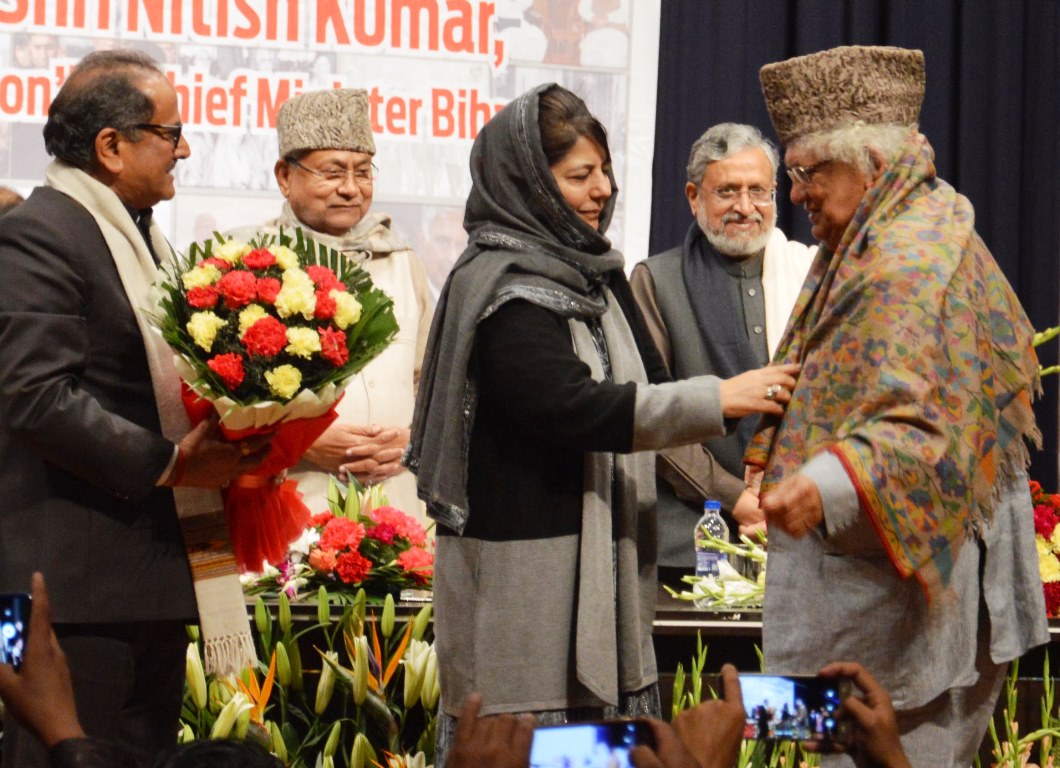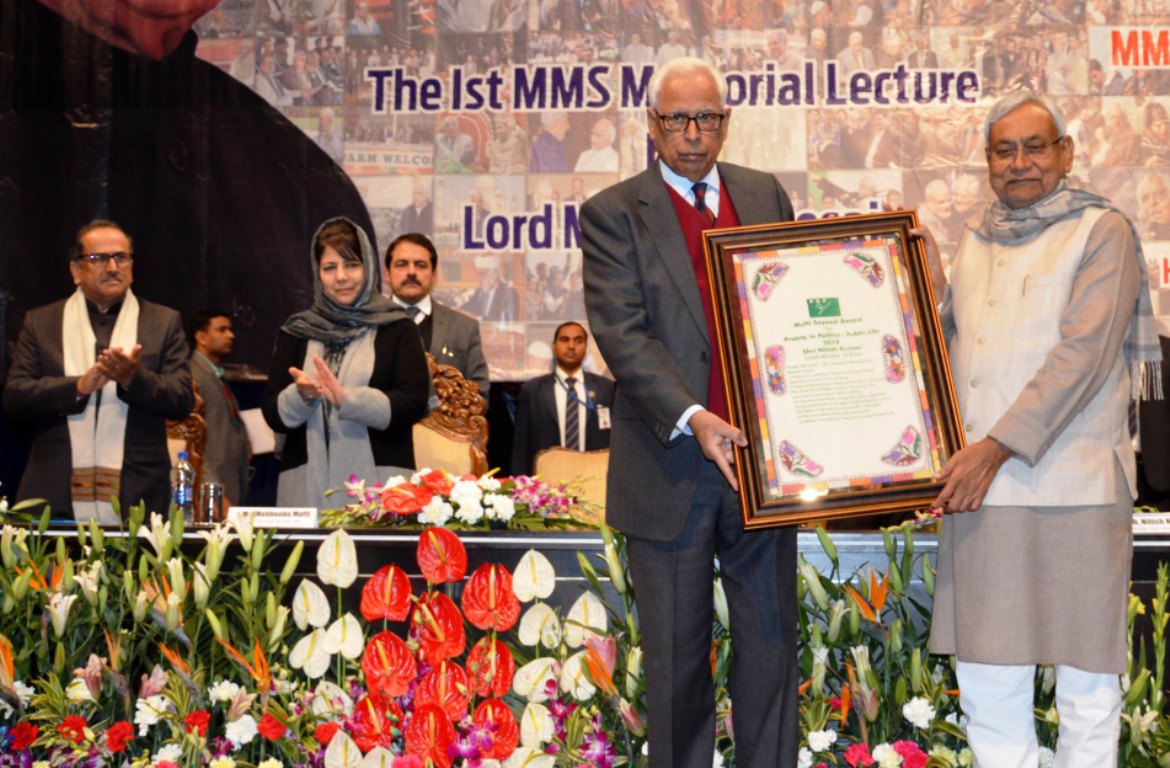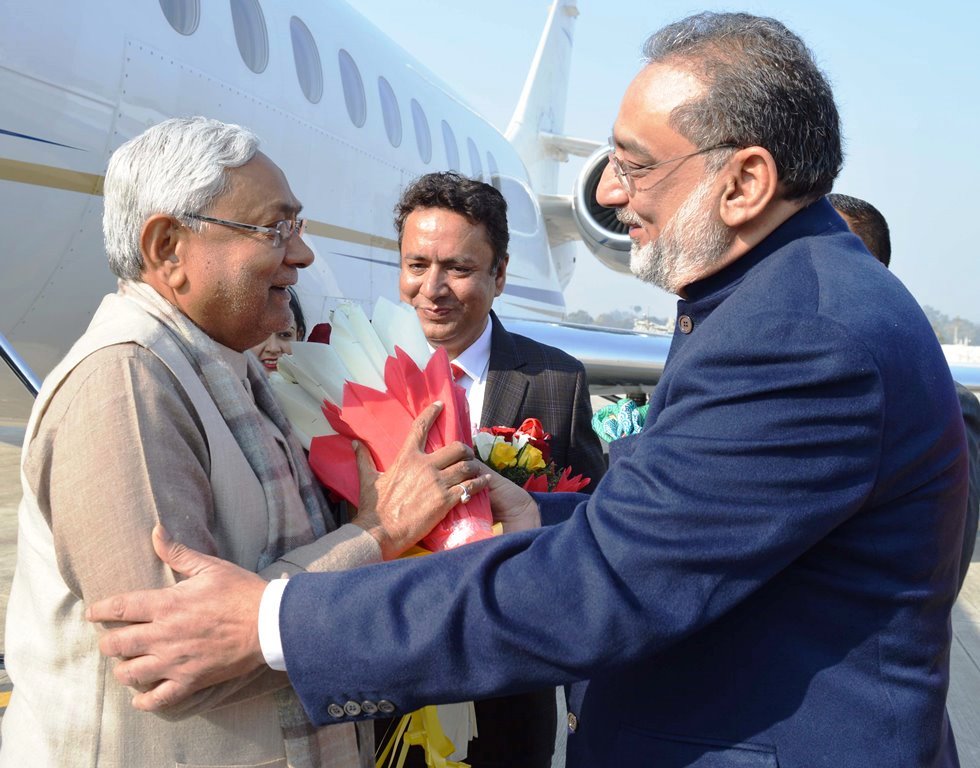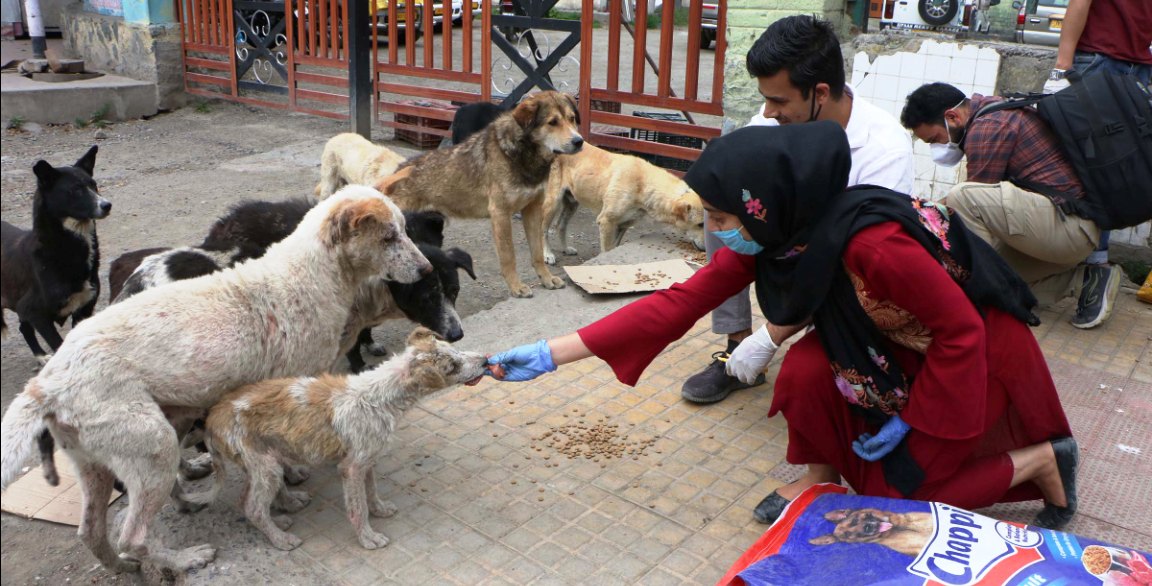by Masood Hussain and Tahir Bhat
JAMMU: On the second death anniversary of Mufti Mohammad Sayeed, there was an emphasis on resolving issues democratically. A top UK politician of Indian origin delivered the first Mufti Memorial Lecture and talked in detail about how Westminster managed the independence demands from various of its regions through honest referendum and other democratic means.
The process has converted UK into a four-nation state where four nationalities co-exist with respect and dignity.
British Indian politician, from the Labour Party, intellectual and author, Lord Meghnad Desai, who delivered the first Mufti Mohammad Sayeed Memorial Lecture shared British experience of devolving power and managing tensions and crisis. He spoke on “Devolving Power: The British Experience”.

“As a stranger, I have decided not to speak of your problems but I will tell you about the problems we face in Britain,” Desai told the gathering. On his first visit though, Desai has Kashmir connections. His father in law, a senior police officer, he said, was bridge partner” of Mufti Mohammad Sayeed. “It is a unique story about an old country where at one point of time, the constitution was so centralized that there was no scope for regional variations. There was one single parliament.”
Over the last 50 years I have lived there, Desai said, there were steady changes and devolution of power and more autonomy and it was coming from the below, spearheaded by various democratic movements. “People there (in Northern Ireland, Wales, Scotland) thought that if they had their own autonomy in the region, they might be able to perform better than the canter did. They could look after the welfare of their populations better given whatever money they may be given.”
Lord Desai said that Britain handled the experiment of nationalities within well and the frequent referendums conducted in Scotland, Ireland and Wales, and the devolution of powers in these countries were its examples.
Desai started with the UK experience from Scotland.
This movement for devolution power, he said started first from the Scotland in seventies. Labour Party that was drawing support from the Scotland managed an act that suggested an assembly to manage certain things, an idea that was put to vote trough a referendum. To this, he said, an opposition MP put an amendment that the move must have support of 40 percent of electorate, and not by a simple majority so that “it does not look like the movement by a committed minority”.
Interestingly when the referendum took place in 1979, 60 percent voters polled and majority was supportive of the idea but it still was not 40 percent of the electorate and the experiment failed with political costs to the Labour government.
When Conservatives came to power, they did not concede to the Scotland demand for its own parliament. In 1998, Labour government passed a law and put it to referendum. This time an overwhelming majority of eighty percent supported the move, which eventually led to the devolution of powers including an authority to have a separate tax rate. Deasi said Scotland parliament is empowered and strong to the extent that even when UK pulled out of EU, Scotland decided to stay put in the union.
In the next stage, the Scotland sought independence. The Westminster passed the bill and it was put to vote: 45 percent supported it and 55 percent voted against it indicating they were happy with the empowered parliament. “It was not being debated in England, there was no anger or joy over Scottish people trying to move out of UK,” Desai said. “They said let them go if they want to. There has been a civilized debate going on for last thirty years about devolution of powers and independence.”
Then, Desai started about the Wales, a state that lacked any sort of independence since thirteenth century when English conquered it. UK gave them three referendums, which failed, and eventually, Deasi said, they agreed to have a lesser-devolved assembly that tackles education, health and social services.
Northern Scotland, Desai said, was a piquant situation. Ireland broke away independent from UK in 1920 but six counties in Northern Ireland decided to stay with UK and were called unionists for deciding to stay with UK. This eventually triggered a sectarian divide, terrorism and counter-terrorism. In 1998 there was Good Friday agreement and separate referendums were held for the Catholics and Protestants.
“That is an interesting way of tackling majority-minority problems,” Desai said. “Minority has its own rights and should not be browbeaten by the majority.” He termed it an “inventive solution” to the Northern Ireland problem and now there is a government in which both the Protestants and Catholics have to sit in the government together.
“Unless they do not sit together there will be no government and the rule goes back to the Westminster,” Desai said. “There was partition but there was enough of goodwill as well and with the help of Ireland and US, there was peace.”
He said the UK that once had centralized constitution now regards itself a countries of for regions and four nationalities, four nations and they proudly talk about four capitals. “It is a big cultural transformation,” Deasi said. “There were discussions within the political parts and across the political parties, there were protests and trikes but eventually the argument was that we have to respect the opinion of the people. But the way the wishes of the people are check has t be carefully calibrated so the decision is not driven by a fanatical minority and that the minority should not also lose out because they do not have enough numbers”
Similar experiments, he said, were also conducted in other places like Catalonia but Spain had not tried the British way, as its constitution does not allow such devolution.
The other highlight of the event was that governor N N Vohra had a word of counsel for the state government insisting that the level of engagement with people has gone down in comparison when Mufti Sayeed alive.
Nitesh Kumar Awarded
On the occasion the first ‘Mufti Muhammad Sayeed Probity in Politics & Public Life’ award was conferred upon Bihar chief minister Nitish Kumar. Governor N N Vohra presented an award, a shawl and traditional fur cap to Kumar.
Speaking on the occasion after receiving the award, Kumar thanked Chief Minister Mehbooba Mufti and Mufti Mohammad Sayeed Trust for conferring award to him for his Probity in Public life.

“It is moment of happiness for me and Bihar that I was honoured by Jammu and Kashmir. My focus is on development, peace and a corruption free and transparent governance in Bihar”, Kumar said.
He said that all the disputes could be resolved only through and battle would not solve anything.
Kumar said that he remembered his association with late Mufti since the Janta Dal days. “Mufti Mohammad Sayeed was a tall political leader and only home minister of India from Muslim community. He always worked for peace.” Kumar said Mufti’s contribution is immense and his role is historic in the socio-political arena of the state.
N N Vohra, one of Kashmir’s long time governors was blunt in his observations. “It seems we are not excessively engaged with the issues concerning our people,” Vohra said. “We failed to protect our youth.”
“There is a lot of disruptions in academics, exams, results are delayed due to the situation that has been created which pulls entire policy back,” Vohra said. “There are a lot of problems some of them are our own creations.”
Finance Minister Dr Haseeb Drabu thanked the speakers and the guests.
Interestingly, all the three speakers including Deasi, Nitish Kumar and governor, stressed on inclusiveness, development and progress of all sections of the society.
Official Statement
Meanwhile, the official spokesman quoted Bihar Chief Minister, Nitish Kumar saying that Mufti Sayeed always believed in peaceful resolution of issues rather than acrimony or discord.

Delivering his speech of acceptance after receiving the Mufti Muhammad Sayeed award on Probity in Politics & Public Life here today, the six times Bihar Chief Minister said the late leader had a firm belief that issues confronting a system can be resolved only through dialogue and negotiations. He said the late leader always gave a new direction to the position he occupied. He said he enjoyed a long but intense relation with late Mufti Sayeed in whom he always found a leader who was concerned about the welfare of his people.
Kumar, during the speech, narrated his long association with the late leader from the times of Jan Morcha, Janta Dal and later as his deputy in Home Ministry when late Mufti Sayeed became the first Muslim to head it. He said he also had an opportunity to work with him as the members of Political Affairs Committee of Janata Dal and later in different roles as well.
During 2003, as the Railway Minister, Kumar said, he worked with late Mufti Sayeed and found him very keen to extend railway network to Kashmir to rid the region off economic backwardness. “It was difficult to carry forward work on Udhampur-Katra-Baramulla rail link due to some communication gaps but he (late Mufti Sayeed) persuaded us to work on the project seriously”, he told the gathering. He said the late leader was very keen on preserving the heritage and old cultural pattern of the place and during the construction Srinagar Railway station he, as the Chief Minister, took keen interest in maintaining and preserving the grandeur of the place.
On the occasion, renowned economist, columnist and British Parliamentarian, Lord Meghnad Desai also delivered the first Mufti Memorial Lecture on the subject Devolving Power: The British Experience in which he traced the legal and constitutional journey of the British society.















